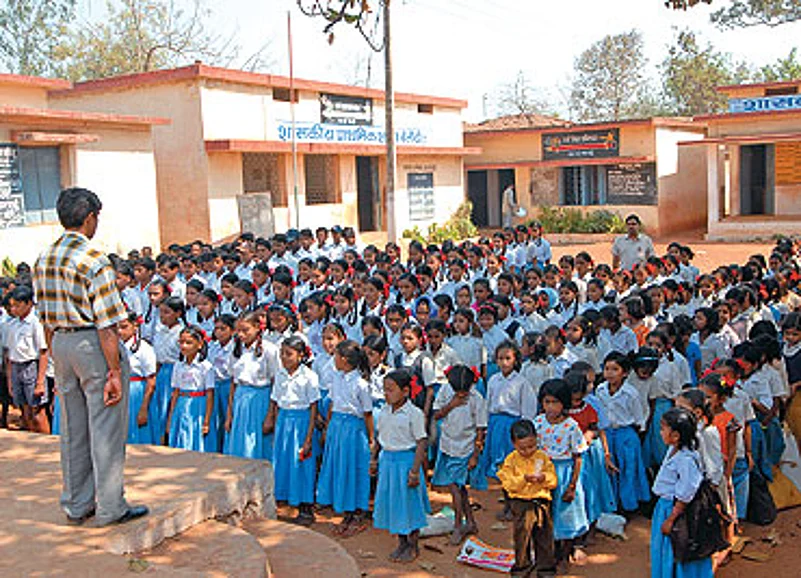Chalk and Slate: Annually only around 30,000-40,000 youngsters are imparted vocational training or skill development as against the industry need for over one million skilled workforce.
ABC...123: In rural areas, school attendance is 84 per cent for boys and 79 per cent for girls
***

Children attend a morning assembly in a government school
Similarly, many other states—Himachal Pradesh, Chhattisgarh, Madhya Pradesh, Rajasthan, Assam, West Bengal—have forged models of partnership. The ASER reveals a quantum jump in enrolment, provision of schools, toilets and water supply, and mid-day meals wherever public-private partnership (PPP) models are adopted. In some states, the school dropout rate (from 6-16 years of age) has declined from 6.6 per cent in 2006 to 4.2 per cent in 2007.
What is really significant is that Bihar has taken the lead in providing vocational skills in the secondary school level. Pratham has started teaching applied arithmetic and computer application to former child labourers now going to local schools. The NGO also conducts similar skill programmes in several parts of Maharashtra so that youngsters in rural areas can seek jobs in data collection, insurance and store-keeping. "There is a need for including more applied skills in our curriculum. Unfortunately, our whole approach is academic," says Pratham director, research, Rukmani Banerji.
That's a no-brainer: as in the West, Indian students should also be taught skills and made to undergo apprenticeships while still in school, as it helps them prepare for the work space. Unfortunately, skill development happens only at the graduate level. An ilo report highlights that "a particularly striking feature of most government and donor poverty reduction strategies in developing countries is that the role of vocational education and training (VET) in its wide variety of forms is largely absent".
ilo is currently partnering the Indian government to bring an employment focus into the curriculum—and not just a separate stream—after the 10th standard. For a start, the labour ministry has opened the doors of Industrial Training Institutes (ITIs), which provide specialised training to meet growing market requirements, to current students or those who dropped out after the fifth standard. Now, any child of 14 years and above can enrol for different short-term training courses being offered at the ITIs. Encouragingly, girls are also being offered choices beyond the traditional tailoring and food preservation at 359 institutes exclusively for women. In the other institutes, 30 per cent reservation of seats for women has been recommended.
Till 1969, the ITIs were under the control of the central government. With their transfer to the states, most of them had fallen into neglect. It is only over the last two years that the Centre has stepped in with funds to offer industry incentives to adopt ITIs. So far, around 800 institutions have been taken over for upgrading facilities. Already, some as in Bhuj and Anjar are thriving in partnership with local industries like Ashapura Group and Welspun. "Skill-set development is critical to making and creation of entrepreneurship and instilling confidence among youth," echoes Radhika Haribhakti, director and head of csr, dsp Merrill Lynch and chairperson of micro-credit organisation Friends of Women World Banking.
Going beyond just providing seed capital to start an enterprise, many among the 125 micro-credit organisations have started providing education and training inputs to prospective entrepreneurs. Historically, microcredit is dominated by the southern states, but now states like Orissa and West Bengal are seeing increasing activity. The key is that by empowering and training women, these organisations also plant the seed of education, skilled or otherwise, for their families. "Women's empowerment is a major offshoot of this group dynamism," says Kishore Kumar, country head (Microfinance), hdfc Bank.
Take the women of Bagjola Colony in Calcutta. Their earning status has gained them respect, a sense of empowerment and, most importantly, a strong voice in their families and the community. All this is attributable to Bandhan, which Forbes lists as the world's second-best microfinance institution. Says Bandhan's founder and ceo, Chandra Shekhar Ghosh: "The only way to empower women is to provide them with the means to earn." And it's translating into a desire for education. Dipali Dey, who took a loan of Rs 10,000 last month, says: "When I started earning, I insisted on putting my kids in a good school. Had it not been for this, my kids wouldn't have got good education."
Similarly, based on feedback from women clients, sks Microfinance is expanding a pilot programme of running primary schools. From 20 primary schools in Andhra Pradesh, the company is planning another 20 schools. It has also tied up with Delhi-based Career Launcher to train school teachers, building on its success in training and deploying 6,219 employees, mostly from rural areas, across 15 states. Vivek Mansukhani, director of Ford Foundation International Program, says, "Our target group is people who need mentoring and access to opportunities. Through training and access to higher education, including overseas, we are able to hone their leadership for social justice."
These partnerships are making a difference because they answer the community's need. Partnerships in education deliver better, says nkc member Jayati Ghosh, "if the community and the parents are also given greater say in the management of the schools and for adapting the curriculum to meet local conditions". In such conditions, even government schools give good results—look at the Kendriya Vidalayas, for example. Or the fact that rural areas with good government schools have very few private schools for company. There is a lesson here somewhere.






















